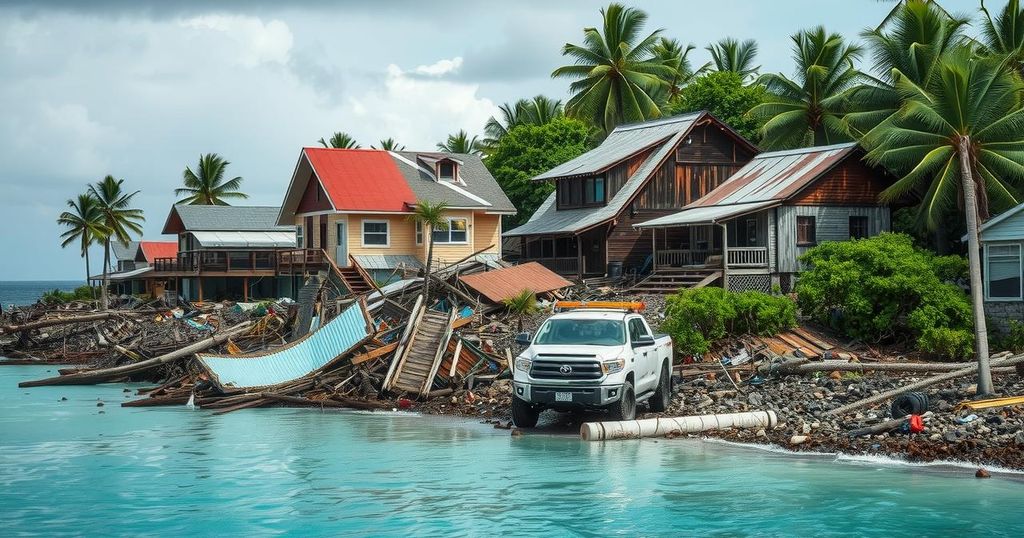Devastation in Mayotte: Hundreds Feared Dead as Cyclone Chido Hits Hard
Tropical Cyclone Chido has devastated Mayotte, leading to hundreds feared dead and critical infrastructure severely damaged. With a current death toll of 20, government officials predict this will increase significantly. The cyclone’s impact is exacerbated by the island’s socio-economic challenges, particularly in densely populated slum areas where essential services were disrupted. Recovery efforts are ongoing, but the situation remains dire.
Tropical Cyclone Chido has wrought havoc across Mayotte, a French territory situated northeast of Madagascar, resulting in vast devastation and leading to hundreds feared dead. The cyclone, classified as equivalent to a Category 4 hurricane, achieved peak winds over 155 mph, marking it as one of the most powerful storms on record to impact the area.
As of the latest reports, the official death toll stands at 20, yet Mayotte Prefect François-Xavier Bieuville warned that the number may rise to several hundred or potentially approaching a thousand as the situation evolves.
The cyclone intensified in unusually warm sea temperatures, colliding with a densely populated island where a significant percentage of the residents live below the poverty line. Despite initial assessments, the situation remains dire, as French Prime Minister François Bayrou acknowledged the exceptional severity of Chido, reiterating uncertainties regarding the full scope of casualties.
Critical infrastructure, including the island’s hospital and airport, suffered extensive damage, hampering aid efforts and medical responses. Officials have reported widespread destruction in slum areas, particularly affecting undocumented immigrants who reside there. Estelle Youssouffa, a member of France’s National Assembly from Mayotte, stated that entire slum areas had been obliterated, with homes stripped of roofs and inhabitants cut off from essential services.
French Interior Minister Bruno Retailleau characterized the situation as “dramatic” and “absolutely exceptional,” underscoring the urgent need for a crisis response. With aid currently being delivered by boat, efforts are underway to restore connectivity and establish temporary medical facilities.
The cyclone traveled directly over Petite-Terre, causing significant devastation before moving towards Grande-Terre. The unique characteristics of Chido, such as the concentration of warm waters and favorable atmospheric conditions, contributed to its anomalous strength and potential impact on communities that were ill-prepared for such extreme weather events. Residents are also grappling with emotional turmoil as many are searching for missing loved ones in the aftermath.
In summary, Cyclone Chido has highlighted the dual crisis of climate vulnerability and social inequities, as the population grapples with loss, displacement, and a desperate need for assistance amidst increasing fears of mortality and hunger. This storm represents a call to action regarding both disaster preparedness and addressing the broader social issues faced by the territory’s impoverished communities.
Tropical Cyclone Chido represents a significant climatic event impacting the French territory of Mayotte, which comprises two islands and numerous smaller islets. With sea temperatures above average, the cyclone intensified remarkably, bypassing Madagascar without significantly weakening before striking the island. Chido marks an alarming trend in increasing cyclone intensity linked to climate change, urging consideration of the region’s socio-economic challenges, especially the vulnerability of impoverished communities.
In conclusion, Tropical Cyclone Chido has unleashed unprecedented destruction in Mayotte, leaving hundreds feared dead and extensive damage to infrastructure, particularly in impoverished areas. As recovery efforts commence, the severity of the situation underscores the need for improved disaster preparedness and a holistic approach to address the underlying social vulnerabilities. The impacts of such storms will likely persist, necessitating awareness and support for affected populations.
Original Source: www.spokesman.com




Post Comment